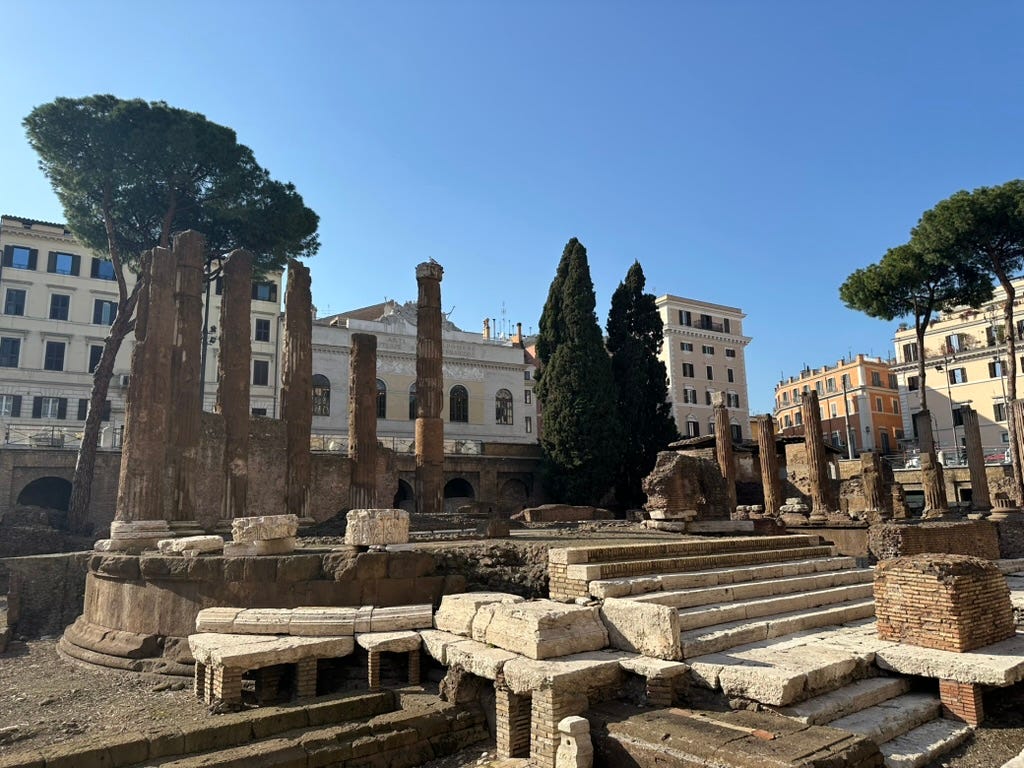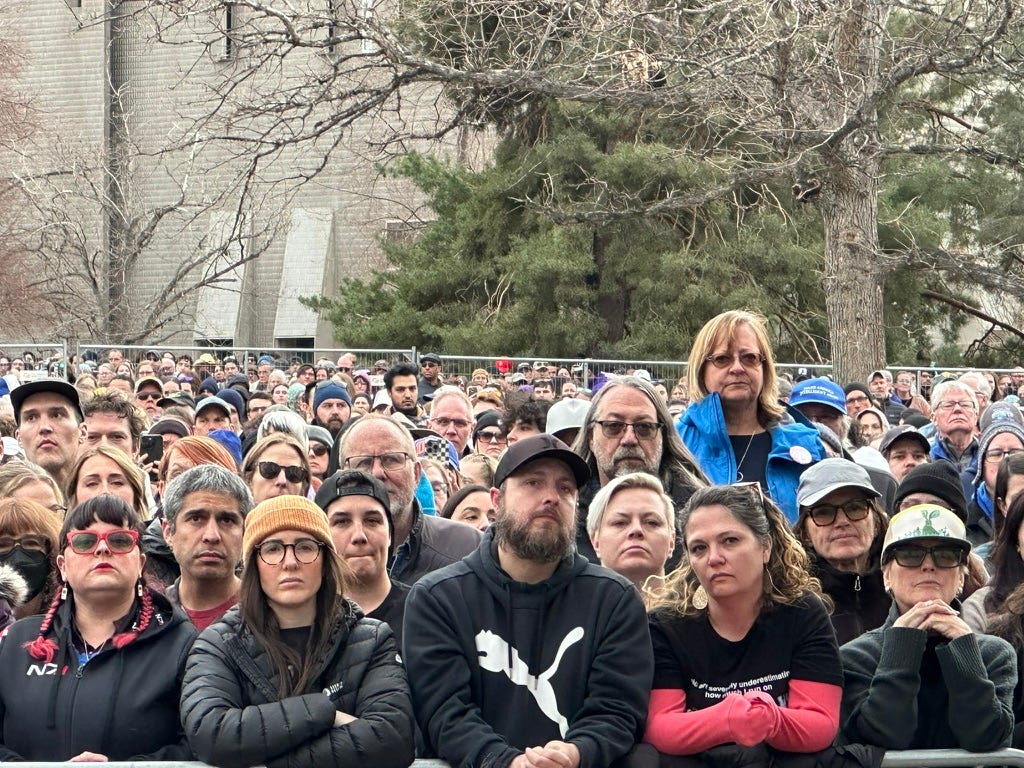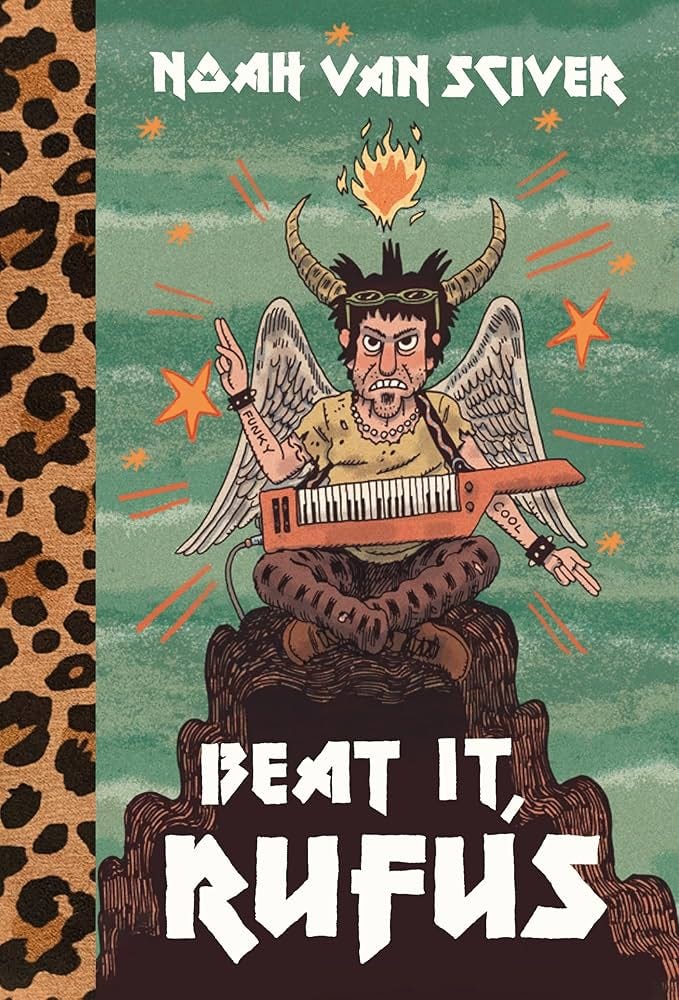(Photo by me, Jan. 30 at Georgetown)
Been a while since I took that picture. Martin O’Malley didn’t win the DNC chair election, and I didn’t use many of my Sundays to write. I went on a reading run instead. Downtime, whether I got in commuting to work or waiting for a train on vacation, went into the books. Writing time was spent on other work.
I regret writing here a bit less. That’s the only regret. We like to travel for my wife’s birthday — I don’t care much what we do on mine — and had, over Thanksgiving, broken out a trip to Italy. She had never been there, and I’d never been as an adult. Twenty-five years earlier, when my parents moved our family to England, a favorite high school teacher took advantage of the tax-subsidized low prices for intra-Europe travel and let us do five days in the cities we’d been reading about. Venice, Verona, Florence. My mom remembered me, age 18, calling from Venice to tell her that Paris was overrated; this was the most romantic city in the world.
What did I know about romance? Barely anything. The CW is basically right: Paris is a romantic city, and Venice is a floating museum, touristed more than any other non-Disney place you’ve ever been. From Florence, I remembered only pausing when a girl on our group got pick-pocketed, the fear of every ex-pat parent, a situation every kid had trained for, but seemed too much like a TV movie plotline to really happen.
My memories weren’t dark, but they were juvenile. Venice was where I learned not to pity the restaurants that paid a waiter to beg tourists to come in. A group of students fell for it and sat at an outdoor bistro where the tablecloths were recycled paper and the bread could chip marble. I went looking for a perfect moment in St. Mark’s and remembered hearing a violin player accompany a muzak version of “The Godfather” theme. Why did I think this was romantic? Boats. Boats, that’s why. I intuited that this would be a girl’s dream vacation and realized I should bring one there, eventually.
So I did. We started in Milan. Our first day was the last of fashion week. We had a light schedule, oriented around seeing “The Last Supper,” and cabbed back through the blocks of high-end stores where models were crossing the street for photographers. Leaning out our windows, it was impossible to tell which photographers did this for a living, and which were amateurs with $1500 to spend on good DSLRs and new lenses.
After a short rest, we got dinner by the hotel; veal hammered thin and lightly fried, chased with a Sicilian red wine. An English couple with the table next to ours heard that we were together in the country for the first time, so we gave them our itinerary: Milan to Venice to Rome. “That’s the way to do it,” said Mark, the husband. “This’ll be the worst bit.” There’d be no surprises in Milan. I do like vacations to improve as they go, or else I get nostalgic before they’re over. We got ready for the second day.
It started with a walk through the luxury store blocks, which went on forever, then the Duomo, which I hadn’t thought much about before the trip but recognized right away. This was it, the church that From Software’s designers studied to build Anor Londo, the mystical capital of Lordran “Dark Souls,” where you can climb on the railings and are constantly at risk of being shot down by archers.
After dark we went to La Scala, with two tickets for “Eugene Onegin,” knowing nothing about it except the story. (Me from reading it, her from me trying to explain it, a husband’s favorite pastime.) The costuming and staging were modern, and for locals, the tickets were fairly cheap. This gave something unexpected, in a venue where ushers wear special medallions around their necks to celebrate the opera house’s history: Some people hated it and quit. The party scene, the part when an older and more desperate Eugene sees Tatyana again, was staged like a wedding afterparty, with lose dancing, some of it gangly and embarrassing. This was too much for an angry Italian man across the room from us. He screamed something about a “discoteca” — we think we got it — and was booed into silence before the next scene started. When it was over, we were among the first people up to applaud. Was it bad? Did we just lack taste? We banished that thought as, it being too late to get a sit-down meal, we stopped at a kebab house near our hotel and grabbed gyros on rice to go.
Venice was blurrier; we got just one night in a hotel there on La Giudecca, a mini-resort that we could only access by small boat or water bus. Lucky again, we were there for the last, anything-goes day of Carnival, and got to the plaza right as a final parade of costumed dancers moved through it.
I’d been way too cynical for this stuff when I was 18.
We came back with gifts for friends, mostly foodstuffs. You can buy expensive pistachio butter at almost any cute shop in a gentrified neighborhood. But why not buy it in a city where they sprinkle them on anything? You don’t own cauliflower cream, never really heard of it, but sure, bring it home, you’ll find a use for it.
We bought gifts for each other. I thought it would be amusing to shop at the Gucci store. Not because I was too pure for it, or so sophisticated that I considered it a zombie label that up-charges to status hogs. My wife knows a lot about stitching and clothing quality, and she vouched for it. We walked in, me dressed better than most tourists but worse than most Gucci customers. I accepted the free espresso, a perk I’d only ever been offered previously at a L.A. barber shop near improv schools. (You’re right, that’s unspecific.) Like a gambler, I gave myself a spending limit, then found the blue loafers I wanted, then asked for the price. And like a gambler, I blew past the spending limit. When we walked into Rome’s Kenzo store and found a perfect purse, a perfectly smooth one with a martian rock body and neon green trim, I found her gift.
The obsessive reading that I kept up on the trip, that’s the reason for this journal, has taught me that lists of products and provisions are fun to read. I’m not sure why. The first surviving writing, before anything creative was notched into clay and dried out, was ledgers. Spreadsheets, basically. Man developed the written word and he used it to count wheat. This makes me appreciate that we moved beyond lists, and makes me wonder if we are just hard-wired to enjoy them. Here is a list: Amaro Montenegro, spaghetti al nero, Nero d'Avola wine, arancini siciliani, Pizza Bonci. That last place is where I was served a whitefish pizza on thick crust, which I ate on the walk to the Protestant Cemetery. No cliche was left when I was done with the place. I’d go back today.
Work was a dream. I got re-acclimated to the House press gallery, where I nearly lost my cool in defense of the sign-up chart for soundproof call booths. Hopefully, everyone who watched saw that not as a failure of emotional control, but a zealous defense of the commons. (And I was running five minutes late to my Greg Grandin interview.) When Congress ducked out, I traveled to Pittsburgh and San Antonio and Manchester, places where the economy superficially looks better each time I go and the people get more fed up with the government. Covered the Bernie Sanders tour, which looked like this.
Protests, at this point in the second Trump presidency, have looked grayer than the protests I covered eight years ago. The baby boomers and liberal Gen Xers who have the time to show up at everything, and have the clearest memory of some golden age they want to recover, tend to stand at the front and be most frustrated with the Democrats who come by. They’re the ones who ask “what’s the plan?” after the polite member of Congress has explained the plan. You listen to the heckle and think; maybe it’s not inspiring, to normal people, to be told to wait until district courts take the case and then wait until next November to vote.
I read a lot, so: On to that part.
The Best Thing I Read: This gets much harder if you skip 10 weeks of writing. I’d owned the Lydia Davis translation of “Swann’s Way” for a decade, buying it at the Museum of Jurassic Technology on one of those day-off, high-minded highs. Museums keep so many books in the gift shops, relevant and barely-relevant, because kids want souvenirs, and because adults suddenly think they want to spend more time with the arts and their minds. I took the book on five or six vacations but never seriously attacked until Rome. Not even half hard. All you need is a clear head for an hour, focus, and you are pulled under the waves until you’re done.
Around half my reads were unfinished business. A history book’s on the shelf, it’s got a mark in it. I pull it out, and see if I recognize anything on the bookmarked page. If I do, I pick it up there, and if I don’t I start over. David Nasaw’s “Andrew Carnegie” fell this way (the bookmark was a Wire concert ticket from 2010), and so did “Dangerous Visions,” and so did “Underground Airlines.” You can skip the last one, a modern alternate history set in an America where the Civil War didn’t go the right way; this is an old premise and it’s been handled better at least seven or eight times. I ripped through a few new books to interview them or recommend them (“work books” below) and read short fantasy or sci-fi novels in between the hard stuff. My appreciation for graphic novels didn’t come back, and maybe never will, but the work by artists I read before my fall-off is still interesting enough to buy. The highlight this spring was Noah Van Sciver’s “Beat It, Rufus,” the latest in his portrayals of fictional medium-talents. That was the only trait it shared with “Fante Bukowski,” NVS’s breakthrough hit about a poet more in love with the image of the job than in ever doing it. Rufus is a faded 80s rock star who blew his band’s chance (a bit like Greenberg in “Greenberg”) and searches for psychedelic transcendence to revisit his past (not like “Greenberg”).
The sooner I finish the faster I can start preparing a better short rundown next week. So here:
Books read
Work books
Anson Frericks, “Last Call for Bud Light”
Eoin Higgins, “Owned”
Patrick Maguire and Gabriel Pogrund, “Get In: The Inside Story of Labour Under Starmer”
Judith Butler, “Who’s Afraid of Gender?”
Alex Isenstadt, “Revenge”
Ezra Klein and Derek Thompson, “Abundance”
Jonathan Allen and Amie Parnes, “Fight”
Elie Mystal, “Bad Law”
Timothy Schenk, “Left Adrift”
Mark J. Dunkelman, “Why Nothing Works”
Andrew Hartman, “A War for the Soul of America”
In Italy
Torrey Peters, “Detransition, Baby”
Conn Carroll, “Sex and the Citizen”
Alexander Pushkin, “Eugene Onegin”
Dante Alighieri, “Inferno”
John Julius Norwich, “Absolute Monarchs”
Han Kang, “The Vegetarian”
Started last year, polished off
Philip Short, “Pol Pot”
Ibram X. Kendi, “Stamped From the Beginning”
Various, “Dangerous Visions”
William Carlos Williams, “In the American Grain”
Atul Gawande, “The Checklist Manifesto”
David Treuer, “The Heartbeat of Wounded Knee”
David Nasaw, “Andrew Carnegie”
Ben Winters, “Underground Airlines”
Michael Arnzen, “Proverbs for Monsters”
Fiction
Pat Frank, “Alas, Babylon”
M.J. Engh, “Arslan”
S.M. Stirling, “Marching Through Georgia”
Ian McEwan, “First Love, Last Rites”
C.M. Kornbluth, “Not This August”
Arkady and Boris Strugatsky, “Roadside Picnic”
Roger Zelazny, “Damnation Alley”
Rachel Kushner, “The Flamethrowers”
Arthur Herzog, “IQ 83”
Marcel Proust, “Swann’s Way”
Dan Simmons, “Worlds Enough and Time”
Fritz Lieber, “Swords and Deviltry”
Michael Moorcock, “Elric of Melniboné”
Non-fiction
Jimmy Breslin, “How the Good Guys Finally Won”
Matt Christman, “¡No Pasarán!”
Tom Shales and James Andrew Miller, “Live From New York”
George R. Stewart, “Names on the Land”
Hanna Rosin, “The End of Men”
Greil Marcus, “The History of Rock ‘n’ Roll in Ten Songs”
Isaac Stanley-Becker, “Europe Without Borders”
Paul Fussell, “The Great War and Modern Memory”
Jason Schreier, “Blood, Sweat, and Pixels”
Graphic novels
Noah Van Sciver, “Beat It, Rufus”
Jaime Hernandez, “Life Drawing”
Junji Ito, “The Liminal Zone, Vol. 2”
Josh Simmons, “Jessica Farm”
Josh Simmons, “Dream of the Bat”
Jeff Smith, “Shazam! and the Monster Society of Evil”
Timothy Truman, “Scout”
Hartley Lin, “Young Frances”
The Best Thing I Watched: Best new movie was “Sinners,” which’ll be true for a while. Best old movies, watched in an accidental double feature: “To Live and Die in L.A.” and “Ghost Dog: Way of the Samurai,” two genre pictures that achieve so much more than necessary. Willem Dafoe burning his imperfect painting. The counterfeiter chase through LAX that knocks everybody over. The gangster who loves hip-hop, raps to himself at home, and outwardly must pretend that he can’t stand this stuff. Both worth streaming, both with perfect soundtracks.
The Best Thing I Played: This was the real time suck. Fully admit it. When it rained, and I didn’t work around the house, I indulged my worst instincts and played “Robocop: Rogue City.”
You’re familiar with “Robocop,” the Paul Verhoeven vision about a dystopian Detroit that foresaw a bigger crime surge than we got in the real world, but less of a capital flight. You may be familiar with “Robocop 2.” This game’s plot is jammed in the “Robocop 2” timeline, it seemed to me because it wanted to use as many pieces of familiar IP as possible, and to set up boss fights — without designing new characters — you want to get the sniveling mayor and Tom Noonan’s drug dealer cyborg in there.
The Robocops are not loved for their plots. They stick with us because of their medium-high concepts, their musings on the nature of consciousness separate from the body, and the trucks full of squibs that they deploy on gory action scenes. What if I told you that this game includes a sort of power-up that permanently increases the amount of blood spatter when you shoot through somebody? Would you understand why I spent 3 hours one day playing through it? Or why I put up with a design that requires you, with full robotic slowness, to travel from area to area in search of cars to place tickets on? A tremendously goofy experience, and I felt a little embarrassed when I finished. But I did not regret the time spent.
After I put that down, I goofed around with “Days Gone,” the 2016 post-zombie takeover biker game that puts you in a “Red Dead” sort of open world and gives you endless fetch tasks, broken up by battles with hordes of “freakers” so large and deadly that the music changes at their approach. But I thought it would be better to finish writing.






Thoughts on Detransition, Baby?
I most connected to the part about knowing if you had been 18 you would've been to cynical to enjoy it, I think I had the same too cool for school attitude for most of the places in my life, and it's kind of weird how the older one gets that becomes one of the most (understable) regrets.
Some good books. The work list is quite impressive